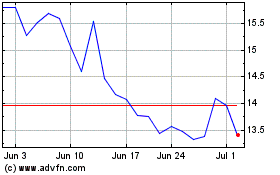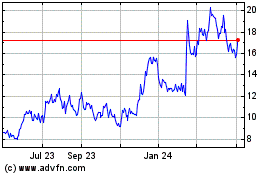Lyft to Offer Waymo Self-Driving Taxis in Suburban Phoenix
May 07 2019 - 5:34PM
Dow Jones News
By Tim Higgins
Lyft Inc.'s ride-hailing app will soon begin offering rides from
self-driving cars operated by Waymo LLC in suburban Phoenix, in
what would be one of the bigger commercial deployments of robot
taxis so far.
Waymo, the self-driving car unit of Google parent Alphabet Inc.,
said it will initially deploy 10 vehicles with safety operators
behind the wheel through the Lyft app in the next few months. Lyft
users in the Phoenix area will be able to select a Waymo vehicle
from the app for eligible rides. Terms of the partnership weren't
disclosed.
Waymo made the announcement just before Lyft released its first
quarterly financial report as a publicly traded company. Lyft
posted a $1.1 billion loss, inflated by expenses tied to its March
initial public offering, while its revenue nearly doubled to $776
million,
Lyft is getting ahead of news from rival Uber Technologies Inc.,
which on Friday is expected to hold its IPO at a valuation up to
$90 billion. Lyft and Uber for years have talked about autonomous
cars being critical to the future of their businesses, though
neither has emerged a leader in the field.
The pairing of Lyft and Waymo is the latest example of how tech
companies and auto makers developing the technology are
increasingly turning to each other to help defray the cost or
expand their offerings. General Motors Co.'s self-driving division,
GM Cruise, on Tuesday announced it had raised an additional $1.2
billion, including from current investors Honda Motor Co. and
SoftBank Group Corp.'s Vision Fund.
"There's a dance that's going on between all of these parties to
find the right dance partner and it's delicate," said Chris Thomas,
co-founder and president of the Detroit Mobility Lab, which helps
promote jobs in the mobility industry. "You want to be sure you're
partnering with teams and entities that share your values, that
share your ambition and quite frankly share your risk
threshold."
Waymo's decision to use Lyft signals it is willing to move
beyond its own ride-hailing app to bring its vehicles to market.
Waymo has been testing its robotaxi service in a 100-square-mile
area around suburban Phoenix, letting residents hail a car with a
safety operator. The two companies in 2017 announced plans to work
together but never detailed what they would do. That year,
Alphabet's investing arm led a $1 billion funding round in Lyft,
which recently went public.
"This first step in our partnership will allow us to introduce
the Waymo Driver to Lyft users, enabling them to take what for many
will be their first ride in a self-driving vehicle," John Krafcik,
Waymo's CEO, said in a statement.
Waymo and Cruise are among the highest profile companies racing
to turn driverless vehicles into commercial robot taxis, an effort
fraught with not only technological hurdles but uncertainty
stemming from questions about regulatory, legal and societal
issues. A death involving one of Uber's self-driving test cars last
year deepened concerns about the safety of the technology, while
supporters say deployment could ultimately save lives.
Uber ahead of its IPO has played down the urgency of widespread
deployment of driverless technology and has sought to spread the
risk to other outside partners, announcing last month $1 billion in
new investment from a group that includes SoftBank, Toyota Motor
Corp. and Japanese auto-parts supplier Denso Corp.
Alphabet took a stake in Lyft as Waymo fought Uber in court,
claiming the ride-hailing startup stole trade secrets from Waymo to
jump-start its own autonomous car effort. The companies settled the
lawsuit in early 2018; and as part of the agreement Waymo received
a 0.34% equity stake in Uber, adding to shares Alphabet already
owned from the early days of Uber. The entire stake is about to
become worth billions of dollars with Uber's IPO.
The partnership between Lyft and Waymo is similar to the one the
ride-hailing service has in Las Vegas with automotive supplier
Aptiv PLC, which is developing its own driverless vehicle
technology. Aptiv deployed its self-driving vehicles with safety
operators in 2018, shuttling more than 30,000 trips around the
Vegas Strip through the start of this year.
Waymo is operating two programs in suburban Phoenix. A
commercial service called Waymo One was introduced six months ago
with safety operators in vehicles that have carried more than 1,000
riders going to work, school and shopping. The other is the Early
Rider program, which is made up of handpicked riders who ride in
cars with the latest updates and sometimes without a safety
operator. Waymo hasn't said when it will roll out a completely
driverless commercial service.
Mr. Krafcik has discussed in recent months some of the technical
challenges the company has discovered, including navigating a
parking lot where the lack of rigid road rules makes it hard for a
robot to interact with human-driven vehicles.
Waymo's gradualist approach in Arizona contrasts with
pronouncements from Tesla Inc. Chief Executive Elon Musk, who last
month promised next year to enable more than 500,000 Tesla vehicles
to travel driverlessly and become part of a commercial taxi
service.
Write to Tim Higgins at Tim.Higgins@WSJ.com
(END) Dow Jones Newswires
May 07, 2019 17:19 ET (21:19 GMT)
Copyright (c) 2019 Dow Jones & Company, Inc.
Lyft (NASDAQ:LYFT)
Historical Stock Chart
From Mar 2024 to Apr 2024

Lyft (NASDAQ:LYFT)
Historical Stock Chart
From Apr 2023 to Apr 2024
